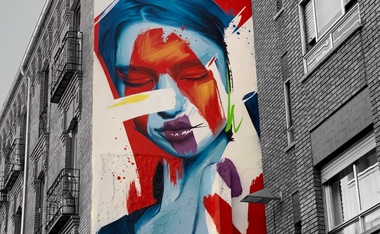The views expressed in our content reflect individual perspectives and do not represent the authoritative views of the Baha'i Faith.
As an actor and a writer, I present workshops related to art and spirituality. Invariably, at least one participant admits to suppressing their artistic urges to give more time to the “important things” in life.
They usually feel it necessary to sacrifice their inner artist to the more tangible topics of family, job, and community. The daily demands of life – paying the bills, maintaining the household, etc. – often take precedence.
Oh, please! Not only is it unnecessary to make such sacrifices, I try to explain, but it is also in opposition to the will of God. Baha’u’llah, the prophet and founder of the Baha’i Faith, wrote:
Arts, crafts and sciences uplift the world of being, and are conducive to its exaltation. Knowledge is as wings to man’s life, and a ladder for his ascent. Its acquisition is incumbent upon everyone.
RELATED: Art and Justice: The Twin Triggers of Human Transformation
For me, two things stand out in that quotation: the fact that arts and crafts are afforded equal status with science, and that to acquire them is not an option but is in fact “incumbent” upon all of us.
Similarly, this excerpt from a tablet written by Baha’u’llah exalts the arts and crafts:
The one true God, exalted be He, loveth to witness handiworks of high craftsmanship produced by His loved ones. Blessed art thou, for what thy skill hath produced hath reached the presence of thy Lord, the Exiled, the Wronged. Please God every one of His friends may be enabled to acquire one of the crafts, and be confirmed in adhering to what hath been ordained in the Book of God, the All-Glorious, the All-Wise.
Isn’t that remarkable? The need for the development of our artistic abilities has been “ordained in the Book of God.” If you’re neglecting your inner artist, it is time to reverse that trend and fulfill the creative destiny the Creator has ordained for you.
Similarly, don’t begrudge yourself beautiful possessions. You need only avoid becoming obsessed by material things. Think of your life as the cake, and the adornments as the icing. Though the cake itself is delicious, the icing makes it sweeter and more special.
As in all things, moderation is the key. Baha’u’llah advised:
Whoso cleaveth to justice, can, under no circumstances, transgress the limits of moderation. He discerneth the truth in all things, through the guidance of Him Who is the All-Seeing. The civilization so often vaunted by the learned exponents of arts and sciences, will, if allowed to overleap the bounds of moderation, bring great evil upon men.
On the necessity of beauty in our lives, the Baha’i composer Ludwig Tuman said:
Acting as an agent of spiritual attraction, beauty thus plays an essential role in the process whereby art seeks to help ennoble the human soul.
This kind of artistic ennoblement is at the crux of our spiritual development. Abdu’l-Baha provided this example: “For the noblest part of the tree is the fruit, which is the reason of its existence. If the tree had no fruit, it would have no meaning.”
If art has to do with ennoblement, then where does entertainment fit in to the overall picture? Let’s look at two opinions that agree on a point. Leo Tolstoy questioned:
But if art is a human activity having for its purpose the transmission to others of the highest and best feelings to which men have risen, how could it be that humanity … should exist without this important activity, and instead of it, should put up with an insignificant artistic activity only affording pleasure?
Indeed, the Chinese dramatist Cao Yu insists:
Art for art’s sake is a philosophy of the well-fed.
These opinions may seem a bit extreme. After all, entertainment itself is not bad – in fact, it’s healthy. Even small amusements can relax you and provide a temporary release from the stresses in your life. But when it becomes the norm, and mere entertainment begins to push out and marginalize art that stirs deep into the mind and soul, you cease to grow. Individuals and societies stagnate, or worse, decline. Moderation and balance are necessary.
Accordingly, Baha’u’llah admonished us to study those arts and sciences that will: “… result in advantage to man … ensure his progress and elevate his rank.”
RELATED: Art Is an Act of Spirituality
This would not be the product of art created simply for pleasure. Again, there is nothing wrong with pleasure; it’s an inherent effect of contemplating beauty in all its manifestations, but it is and should remain in most cases a secondary result and not the initial purpose of the artist. That being said, it is neither necessary nor prudent to deprive yourself or others of beautiful things and/or surroundings—rather, you should include them in your life. As Abdul-Baha has written:
All that has been created is for man, who is at the apex of creation, and he must be thankful for the divine bestowals. All material things are for us, so that through our gratitude we may learn to understand life as a divine benefit. If we are disgusted with life, we are ingrates, for our material and spiritual existence are the outward evidences of the divine mercy. Therefore, we must be happy and spend our time in praises, appreciating all things.
It behoveth the craftsmen of the world at each moment to offer a thousand tokens of gratitude at the Sacred Threshold, and to exert their highest endeavor and diligently pursue their professions so that their efforts may produce that which will manifest the greatest beauty and perfection before the eyes of all men.
Many Native American cultures understand that beauty need to be woven into every aspect of our lives to make us whole. Appropriately, let’s end this series with a Navajo prayer, part of a nine-day ritual called the Night Chant:
In beauty may I walk.
All day long may I walk.
Through the returning seasons may I walk.
On the trail marked with pollen may I walk.
With grasshoppers about my feet may I walk.
With dew about my feet may I walk.
With beauty may I walk.
With beauty before me, may I walk.
With beauty behind me, may I walk.
With beauty above me, may I walk.
With beauty below me, may I walk.
With beauty all around me, may I walk.
In old age wandering on a trail of beauty, lively, may I walk.
In old age wandering on a trail of beauty, living again, may I walk.
It is finished in beauty.
It is finished in beauty.
















Comments
Sign in or create an account
Continue with Googleor